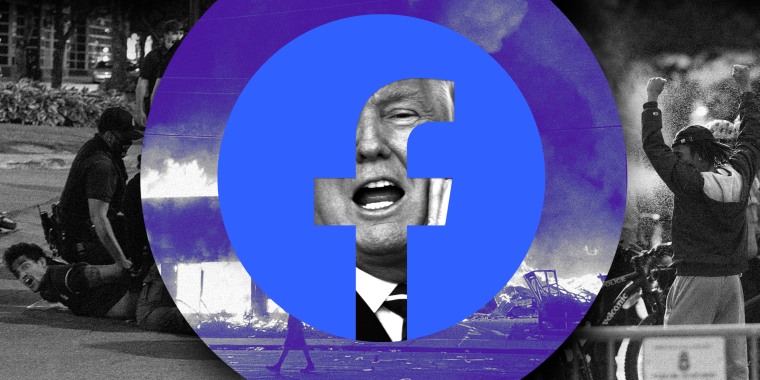Another day, another damning report about Facebook.
In the summer of 2020, as people took to the streets to protest the brutal killing of George Floyd while in Minneapolis police custody, then-President Donald Trump used hateful, violent rhetoric in social media posts to demean and vilify the activists.
“These THUGS are dishonoring the memory of George Floyd, and I won’t let that happen,” Trump tweeted and posted on Facebook days after Floyd’s killing last May. “Any difficulty and we will assume control but, when the looting starts the shooting starts!”
Civil rights leaders were swift to denounce Trump’s “looting” line, given its racist origins: A Miami police chief in the late 1960s first used the phrase to promise violent crackdowns in Black neighborhoods amid a surge in crime.

Unlike Twitter, Facebook refused to remove or block Trump’s post. Facebook CEO Mark Zuckerberg defended the decision, which he said aligned with the company’s commitment to “free expression.” But internal documents obtained by The Associated Press showed Facebook’s own automated controls at the time found Trump’s post almost certainly broke the company’s rules against inciting violence.
“Our violence and incitement classifier was almost 90% certain that this (Trump) post violated Facebook’s ... policy,” according to an internal Facebook memo from June 2020, which noted that “situations really escalated across the country” after Trump’s post.
A Facebook spokesperson told AP that its internal controls don’t always correctly predict when a post has violated the platform’s rules. Human review, which was used in Trump’s “looting” post, is more accurate, according to the spokesperson.
The leaked documents should remind Facebook users that they’re not guests at the company’s table — they’re the food on the plate.
But by June 2, “we can see clearly that the entire country was basically ‘on fire,’” a Facebook employee wrote in the internal memo, referring to a spike in reports of hate speech and violence across the platform after Trump’s looting post.
A Facebook spokesperson denied that the tsunami of user reports was the result of “a single Donald Trump post.”
“Facebook often reflects what’s happening in society and the only way to prevent spikes in user reports during these moments is to not allow them to be discussed on our platform at all, which is something we would never do,” the spokesperson said.
Still, it seems clear that Facebook officials knew Trump’s rhetoric was likely to cause harm, and those with power to take action refused to do so. Facebook eventually imposed an indefinite ban on Trump immediately after the Jan. 6 attack on the U.S. Capitol, though reduced that suspension to two years in June.
The June 2020 memo is part of the "Facebook Papers," a trove of redacted, internal documents gathered by 17 collaborating news organizations. Facebook whistleblower Frances Haugen shared the documents with reporters and lawmakers ahead of her congressional testimony earlier this month.
A Wall Street Journal report last month touched on the existence of the "looting" memo as part of a broader story on Facebook’s policy of exempting high-profile users “from some or all” of the site’s rules.
The new AP report depicts Facebook in a familiar light: as a company desperately pursuing profit in spite of the human costs. Taken together, the leaked documents should remind Facebook users that they’re not guests at the company’s table — they’re the food on the plate.
Related posts:
Herschel Walker endorsements from high-ranking Republicans underscore sad truth
Glen Youngkin’s new ad shamelessly panders to white parents
Rep. Mo Brooks's latest Jan. 6 remarks are just icing on the disgraceful cake
Head over to The ReidOut Blog for more.
